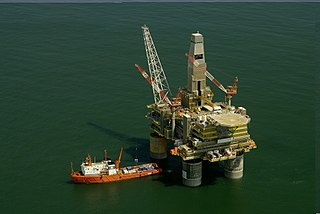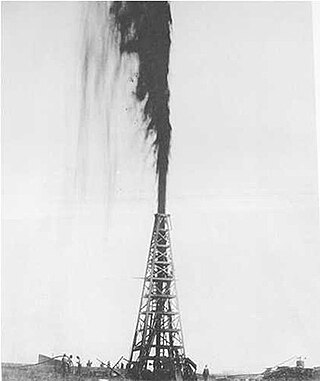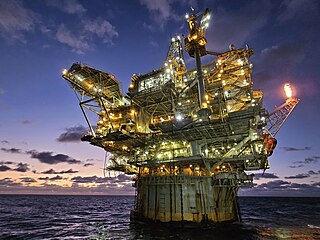Related Research Articles

An oil platform is a large structure with facilities to extract and process petroleum and natural gas that lie in rock formations beneath the seabed. Many oil platforms will also have facilities to accommodate the workers, although it is also common to have a separate accommodation platform linked by bridge to the production platform. Most commonly, oil platforms engage in activities on the continental shelf, though they can also be used in lakes, inshore waters, and inland seas. Depending on the circumstances, the platform may be fixed to the ocean floor, consist of an artificial island, or float. In some arrangements the main facility may have storage facilities for the processed oil. Remote subsea wells may also be connected to a platform by flow lines and by umbilical connections. These sub-sea facilities may include one or more subsea wells or manifold centres for multiple wells.

The National Iranian Oil Company is a government-owned national oil and natural gas producer and distributor under the direction of the Ministry of Petroleum of Iran. NIOC was established in 1951 and restructured under The Consortium Agreement of 1954. NIOC ranks as the world's second largest oil company, after Saudi Arabia's state-owned Aramco.

The China National Petroleum Corporation (CNPC) is a major national oil and gas corporation of China and one of the largest integrated energy groups in the world. Its headquarters are in Dongcheng District, Beijing. CNPC was ranked fourth in 2022 Fortune Global 500, a global ranking of the largest corporations by revenue.

Eni S.p.A., acronym for and formerly legally known as Ente nazionale idrocarburi, is an Italian multinational energy company headquartered in Rome. It is considered one of the "supermajor" oil companies in the world, with a market capitalization of €50 billion, as of 31 December 2023. The Italian government owns a 30.5% golden share in the company, 1.99% held through the Ministry of Economy and Finance and 28.5% through the Cassa Depositi e Prestiti. The company is a component of the Euro Stoxx 50 stock market index.

Asaluyeh is a city in the Central District of Asaluyeh County, Bushehr province, Iran, serving as capital of both the county and the district. It also serves as the administrative center for Asaluyeh Rural District.
Oil India Limited (OIL) is a central public sector undertaking engaged in the business of exploration, development and production of crude oil and natural gas, transportation of crude oil and production of liquid petroleum gas. The central public sector undertaking is a Maharatna, with the Ministry of Petroleum and Natural Gas overseeing its operations. Headquartered in Duliajan, Assam, the company has its offices in Duliajan, Noida, Guwahati and Jodhpur.

A blowout is the uncontrolled release of crude oil and/or natural gas from an oil well or gas well after pressure control systems have failed. Modern wells have blowout preventers intended to prevent such an occurrence. An accidental spark during a blowout can lead to a catastrophic oil or gas fire.
The International Association of Oil & Gas Producers (IOGP) is the petroleum industry's global forum in which members identify and share best practices to achieve improvements in health, safety, the environment, security, social responsibility, engineering and operations.

The petroleum industry in Azerbaijan produces about 873,260 barrels (138,837 m3) of oil per day and 29 billion cubic meters of gas per year as of 2013. Azerbaijan is one of the birthplaces of the oil industry.

The Ministry of Petroleum (MOP) (Persian: وزارت نفت, romanized: Vezârat-e Naft) manages the oil industry, the producer of oil and petrochemical products. MoP is in charge of all issues pertaining to exploration, extraction, exploitation, distribution and exportation of crude oil and oil products. In addition, according to the "Imports and Exports Regulation Act", issuing import licenses for such products is also among the functions of the Ministry of Petroleum. The ministry has been placed under sanctions by the United States Department of State as of 2020.
The South Pars/North Dome field is a natural-gas condensate field located in the Persian Gulf. It is by far the world's largest natural gas field, with ownership of the field shared between Iran and Qatar. According to the International Energy Agency (IEA), the field holds an estimated 1,800 trillion cubic feet of in-situ natural gas and some 50 billion barrels of natural gas condensates. On the list of natural gas fields it has almost as much recoverable reserves as all the other fields combined. It has significant geostrategic influence.

Offshore drilling is a mechanical process where a wellbore is drilled below the seabed. It is typically carried out in order to explore for and subsequently extract petroleum that lies in rock formations beneath the seabed. Most commonly, the term is used to describe drilling activities on the continental shelf, though the term can also be applied to drilling in lakes, inshore waters and inland seas.

Iran possesses significant energy reserves, holding the position of the world's third-largest in proved oil reserves and the second-largest in natural gas reserves as of 2021. At the conclusion of the same year, Iran's share comprised 24% of the oil reserves in the Middle East and 12% of the worldwide total.

Equinor ASA is a Norwegian state-owned multinational energy company headquartered in Stavanger, Norway. It is primarily a petroleum company operating in 36 countries with additional investments in renewable energy. In the 2020 Forbes Global 2000, Equinor was ranked as the 169th-largest public company in the world. In 2023, the company was ranked 52nd in the same list. As of 2021, the company has 21,126 employees.
Saipem S.p.A. is an Italian multinational oilfield services company and one of the largest in the world. Until 2016 it was a subsidiary of Italian oil and gas supermajor Eni, which retains approximately 30% of Saipem's shares.

The petroleum industry of Ghana is regulated by the state-owned Ghana National Petroleum Corporation (GNPC) and administered by the state-owned Ghana Oil Company (GOIL).
The Iran Marine Industrial Company, also known as SADRA, was founded in 1968 as a small ship repair yard in Bushehr. Since then, SADRA has established itself as the leading shipbuilding and ship repairing company in Iran. SADRA is also active in offshore oil & gas development. SADRA specializes in building ships, docks, and floating oil rigs. Sadra Group is a sister company of Iran's state-owned Iran Shipbuilding and Offshores Industries Complex Co. (ISOICO). As of April 2009, the IRGC-controlled construction conglomerate, Khatam al-Anbia owns a controlling stake in SADRA.

The oil and gas industry plays a central role in the economy of the United Kingdom. Oil and gas account for more than three-quarters of the UK's total primary energy needs. Oil provides 97 per cent of the fuel for transport, and gas is a key fuel for heating and electricity generation. Transport, heating and electricity each account for about one-third of the UK's primary energy needs. Oil and gas are also major feedstocks for the petrochemicals industries producing pharmaceuticals, plastics, cosmetics and domestic appliances.
North Drilling Company is an Iranian company specialized in drilling oil and gas wells and its services in all regions of Iran and world, to global customers. The company was privatized in June 2009. As of February 2010, Mehr Eghtesad, a quasi-government investment company, owned 20% of its shares on the Tehran Stock Exchange.

Iran is an energy superpower and the petroleum industry in Iran plays an important part in it. In 2004, Iran produced 5.1 percent of the world's total crude oil, which generated revenues of US$25 billion to US$30 billion and was the country's primary source of foreign currency. At 2006 levels of production, oil proceeds represented about 18.7% of gross domestic product (GDP). However, the importance of the hydrocarbon sector to Iran's economy has been far greater. The oil and gas industry has been the engine of economic growth, directly affecting public development projects, the government's annual budget, and most foreign exchange sources.
References
- ↑ "Iran-daily.com". Archived from the original on 2012-07-09. Retrieved 2010-05-23.
- ↑ "Iran-daily.com". Archived from the original on 2009-03-22. Retrieved 2009-03-17.
- ↑ "Iran to participate in oil projects abroad". 21 November 2016.
